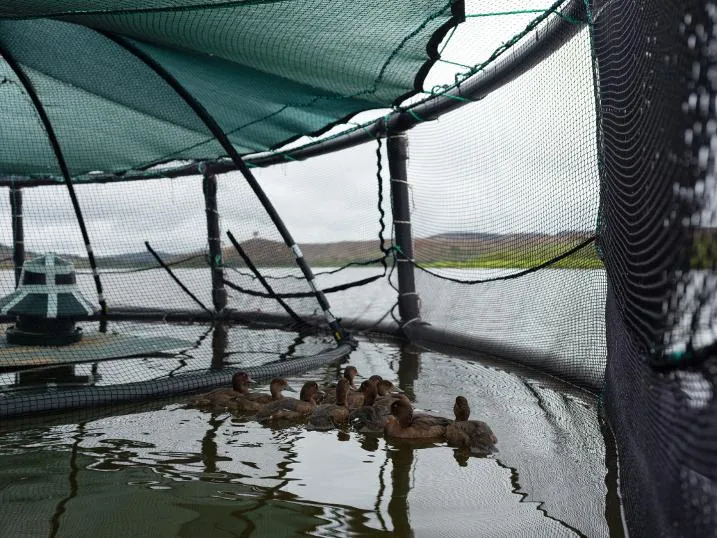One of the World’s Rarest Birds Has Been Reintroduced to the Wild in Madagascar
The 21 Madagascar pochards seem to be faring well in their new home
/https://tf-cmsv2-smithsonianmag-media.s3.amazonaws.com/filer/f8/4f/f84f6688-195c-4f61-af07-e45e4a5eeaef/mad-poch-web-2.jpg)
An unassuming, chocolate-brown duck was once ubiquitous across Madagascar’s wetlands. Then, quickly and largely unnoticed, the Madagascar pochard began to slip away, decimated by human activities like agriculture and fishing.
For 15 years, researchers believed that the duck had gone extinct. But in 2006, biologists stumbled across a small group of 25 pochards living on a remote lake. Now, as the BBC reports, the story of the hardy pochard has taken another promising turn: 21 ducks that were raised in captivity have been released on a lake in northern Madagascar.
After rediscovering the birds more than ten years ago, conservationists collected three clutches of eggs from the wild population and ushered them into a captive breeding program. The few remaining wild pochards were reproducing, but survival rates among their young were dismal. Pushed out of their marshy habitats, the birds had settled in a heavily forested volcanic lake that was too cold for them and too deep. Madagascar pochards hunt by diving; without shallow areas for the ducklings to feed, most died within weeks.
Breeding efforts were more successful for the ducks in captivity. Experts have reared 114 birds to date, according to the Guardian’s Patrick Barkham. A few years ago, they began to make plans for releasing some of the pochards into the wild, but finding a place where the birds would stand a fighting chance was no easy task.
Madagascar’s wetlands have been heavily degraded. A 2017 survey of 37 wetlands in the sprawling island nation off the southeastern coast of Africa found that most had been cleared for agriculture, which in turn “severely impacted freshwater biodiversity.” One of the major threats to the pochard’s survival came in the form of non-native fish species, introduced to the ducks’ habitat for farming purposes. Carp, for instance, disturbed the water and made it difficult for the ducks to find food. Tilapia gobbled up the invertebrates that pochards eat, further fueling their decline.
Finally, experts from the government of Madagascar and three conservation groups—the Wildfowl and Wetlands Trust, the Durrell Wildlife Conservation Trust and the Peregrine Fund—decided that a far northern location called Lake Sofia could make a suitable habitat for the captive pochards. According to the Wildfowl and Wetlands Trust (WWT), conservationists worked to improve the condition of the lake, and also collaborated with local communities to develop farming and fishing practices that would be less damaging to the surrounding environment.
Then came the challenge of acclimating the ducks to their new home. Madagascar pochards spend nearly all their time on the water, so two Scottish fish farming equipment manufacturers designed floating aviaries for the birds—the first aviaries of their kind, according to the WWT.
Ducklings that hatched in October were reared in lakeside pens, then transferred to the floating aviaries in early December, just before they were able to fly. The aviaries kept the birds safe from predation while giving them a chance to get used to the lake. In the hopes of encouraging the pochards to stay in the area and breed, feeding stations and rafts were also installed on the water.

So far, things seem to be going well. The ducks “were released from the aviaries in December and very quickly adapted to the lake, diving and flying, associating with other wild ducks, and returning to the safety of the floating aviaries to feed and roost,” the WWT states.
Experts are anxious to see the reintroduction program succeed, in the hope that it will not only save the Madagascar pochard, but also inspire similar conservation efforts. “The restoration programme at Lake Sofia will encourage others in Madagascar to no longer look at the Island’s wetlands as lost causes,” said Hywel Glyn Young, head of birds at the Durrell Wildlife Conservation Trust. “They may once again be centres of biodiversity while continuing to support communities of people who also depend on them.”